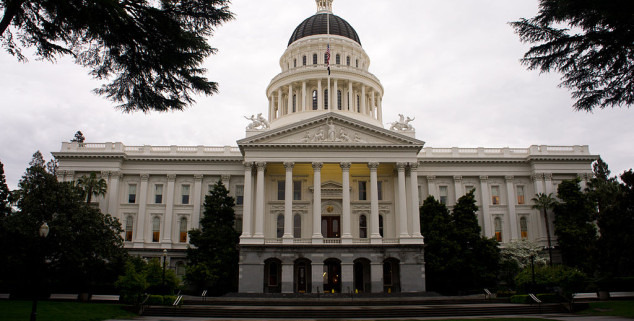Recent News
Millennials eye shot at center stage
 State Capitol, Sacramento. Photo: Wikimedia
State Capitol, Sacramento. Photo: WikimediaWhile Washington, DC is mired in dysfunction and low approval ratings, Sacramento is working in a more functional manner. Gov. Brown is being praised for his fiscal responsibility, while the Legislature has offered accomplishments instead of being bogged down in ideological warfare.
More voters disapprove (45%) of the job the Legislature is doing than approve (38%), but this is the first year since 2007 that a majority do not disapprove (PPIC Statewide Survey of Likely Voters, September 2013).
And a new generation, the Millennials, hope to take advantage of the new politic al landscape.
With a rising sense of the Legislature’s quality comes a greater sense of bipartisanship. But will it last?
The public’s more positive perception of the Legislature is correlated in part to the slowly recovering economy from the Great Recession. But it also may stem from political reforms and legislative actions affecting California.
“It used to be I would tell people running for office, you can’t claim to have done anything in Sacramento, but now voters are willing to accept that things are happening that people can take some credit for,” said veteran political consultant Parke Skelton.
The Legislature has drawn attention over reforms such redistricting, the top-two primary and the majority vote budget. Partisanship even seems to be waning in Sacramento — at least for now — as some Republicans crossed party lines to support driver’s licenses for undocumented immigrants and liberals behaved pragmatically in order to pass a fracking regulation bill.
“Everywhere I go today people are comparing Sacramento and Washington, DC and recognizing a functioning government that they may or not agree with on a policy level, but they can recognize the difference between functional government and dysfunctional government,” said Assembly Member Richard Bloom (D-Santa Monica), who benefited from the redistricting and top-two primary reforms.
Millennials have yet to take the reins of power in Sacramento, but their faces are already becoming commonplace in the Capitol.
“The nature of governance in Sacramento is different than Washington, DC and people would like to see a change in the way things are going nationally,” added Bloom.
Sociologists, political scientists and demographers alike are pointing to strong disillusionment, but they see a positive disposition coming from the Millennial Generation, a political force that politicians and consultants now are forced to reckon with. Millennials are a large cohort of Americans, born roughly between 1980-2000 that even out number Baby Boomers.
Millennials have yet to take the reins of power in Sacramento, but their faces are already becoming commonplace in the Capitol. Millennials even have a voice in the Legislature, Assembly Member Ian Calderon (D-Whittier), born in 1985.
Joining Calderon shortly is another Millennial, Assembly Member-elect Matt Dababneh (D-Woodland Hills), born in 1981 who just won a surprisingly close special election in AD45.
“In large part most people think young people are just more or less uninterested in government or communities but here you take a look at young people today and they volunteer and are involved in organizations,” said Calderon.
There are other Millennials running strong campaigns for open seats too: Andy Katz in AD15, Evan Low in AD28, Sebastian Ridley-Thomas in AD54, Prophet Walker in AD64 and Jesse Petrilla in AD73.
In SD2, a Democratic district, all the Democratic candidates are in their early to mid 30’s, straddling the line between Generation X and Millennials; Chris Lehman, Eric Lucan and Mike McGuire.
“In large part most people think young people are just more or less uninterested in government or communities but here you take a look at young people today and they volunteer and are involved in organizations,” said Calderon. “It’s something that reflects our grandparents generation more than our parents generations.”
In the last 30 years Millennials came of age in a very positive and supportive environment, where they were taught to follow their dreams and work together.
“I think we are a bit more communal. We would rather support something that everyone supports rather than some group of people,” said Calderon. “We want to give people all the same opportunities and nothing less.”
It was a movement that actually came to fruition with an explosion of books in the 80’s and 90’s that were written about self-esteem and child rearing.
Former State Sen. John Vasconcellos (D-Santa Clara), has a lifelong interest in psychology led to his advocacy of the self-esteem movement and the passage of legislation that created the State Task Force to Promote Self-Esteem and Personal and Social Responsibility.
“The task force was created to look at self-esteem and whether it has role to play in education failure, drug abuse, child abuse, welfare dependency and violence and to promote self-esteem and personal responsibility,” said Vasconcellos.
Looking back at his work Vasconcellos said he was pushing for changes in society that Millennials experienced in their childhoods. It was a movement that actually came to fruition with an explosion of books in the 80’s and 90’s that were written about self-esteem and child rearing.
“Millennials are born and raised and educated at a time when the old taboos are under challenge and they are allowed and encouraged to know who they are, lead lives from the inside out, that lead him or her on a healthy path for themselves,” said Vasconcellos.
Millennials have been described as a liberal generation, a generation that defies old social taboos and helped usher Obama into the White House. Eighty percent of likely voters ages 18-34 support same-sex marriage, while this drops to 61 percent ages 35-54 year olds and 60 percent ages 55 and old (PPIC Statewide Survey, Likely Voters, September 2013).
Fifty-three percent ages 18-34 think California is heading in the right direction, compared to just over a third of ages 35-54 (35%) and 55 and older (39%) (PPIC Statewide Survey, Likely Voters, September 2013).
Additionally, a majority (56%) of likely voters ages 18-34 a prefer life with no parole for first-degree murder over the death penalty, while less than half of ages 35-54 (49%) and ages 55 and older (47%) agree (PPIC Statewide Survey, Likely Voters, September 2012).
While Millennials seem to be a strong liberal voting bloc on social issues there is still a high distrust of government and it’s ability to function.
Just a quarter (24%) of likely voters ages 18-34 trust the state government to do what is right just about always or most of the time and 56 percent think a lot of taxpayer money is wasted by state government. Additionally, 62 percent think a few big interests run state government, compared to just 33 percent who say for the benefit of all people (PPIC Statewide Survey, Likely Voters, May 2013).
But, the positive aura of Millennials remains strong.
Fifty-three percent ages 18-34 think California is heading in the right direction, compared to just over a third of ages 35-54 (35%) and 55 and older (39%) (PPIC Statewide Survey, Likely Voters, September 2013).
Some believe the Millennials’ concern for others is a dominant characteristic among their generation , with the need to create a positive future just like the GI Generation did during the Great Depression and World War II.
“People are bored and they are tired. They are tired of the same BS in politics and they have no confidence in government,” said Vasconcellos.
Unemployment figures for young Americans remain high and they are postponing many life milestones such as marriage, owning a home and having children.
“Throughout my campaign I talked a lot about the GI Generation,” said Calderon. “They were a generation that not only worked hard for themselves, but for their children, so their children didn’t have to have another Great Depression and their children could get an education. They wanted to make decisions to benefit the future.”
In 2008 the United States faced an economic crisis that hasn’t been seen since the Great Depression. Today, this economic crisis, dysfunction, divisiveness and distrust in government, mostly pointed at Washington, DC has created a disillusioned and disappointed electorate.
“As a society we lost that perspective, to build for the future for what is going to come after us and instead do things for the here and now and not provide something for the next generation,” said Calderon.
“People are bored and they are tired. They are tired of the same BS in politics and they have no confidence in government,” said Vasconcellos. “They are tired of being talked down to and they are hungry for authenticity and for leaders who call to a higher and deeper purpose then pander to their unhappiness and shortcomings.”
“That is just the world we live in today and we don’t want to make things harder for our kids.,” Calderon said. “I want them to have every opportunity to get a home and provide for their family. To make things better for everyone we have to look out for each other.”
—
Ed’s Note: Nik Bonovich, who specializes in California politics, is a regular contributor to Capitol Weekly.
Want to see more stories like this? Sign up for The Roundup, the free daily newsletter about California politics from the editors of Capitol Weekly. Stay up to date on the news you need to know.
Sign up below, then look for a confirmation email in your inbox.


The only thing that makes CA run better than DC is one-party rule. If you have that you have at least a 50–50 chance of bipartisanship.
You are using the wrong spelling; it’s “reins” not “reigns”.